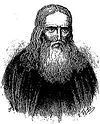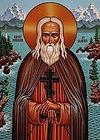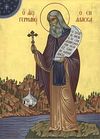

| Previous day | Next day |
| Old Style
November 15
|
Monday |
New Style
November 28
|
|
24th Week after Pentecost.
Tone 6.
Начало Рождественского поста. |
Monastic rule: cooked food, no oil.
|
![]() Martyrs and Confessors Gurias and Samonas (299-306),
Martyrs and Confessors Gurias and Samonas (299-306), ![]() and Abibus (322), of Edessa.
and Abibus (322), of Edessa. ![]() St. Paisius (Velichkovsky) of Moldavia and Mt. Athos (1794).
St. Paisius (Velichkovsky) of Moldavia and Mt. Athos (1794).
Martyr Demetrius of Thrace (307). Martyrs Elpidius, Marcellus, and Eustochius, who suffered under Julian the Apostate (361). St. Philip, founder of Rabang Monastery (Vologda) (1457).
“Kupyatich” Icon of the Most Holy Theotokos (1182).
Repose of St. Herman, Wonderworker of Alaska (1836). St. Quinctian, bishop of Seleucia (4th c.). St. Thomas the New, patriarch of Constantinople (665- 668).
Repose of Abbot Arsenie Boca of Romania (1989).
Thoughts for Each Day of the Year
According to the Daily Church Readings from the Word of God
By St. Theophan the Recluse

Monday. [I Tim. 1:1-7; Luke 14:12-15]
As an indicator of whom to invite to a dinner take for yourself a rule: do not do anything for your neighbor with a view to recompense from him here. But this does not mean that you will spend everything in vain. In due course all will be returned to you. In the Sermon on the Mount about all God-pleasing deeds—prayer, fasting, and alms—the Lord commanded to do them secretly. Why? Because the Heavenly Father will reward you openly. Therefore, a Christian should prepare future bliss for himself through all his labours in life; he should build himself an eternal home, and send provisions there in advance for all eternity. This is not being mercenary, because one’s own material interests as such are limited to this life, while [the future] life is to detriment of these interests. Furthermore, it is impossible to live this way without faith, hope and love towards the Lord. Acting according to the commandments in hope of recompense is also an abstract action. And yet it is closer and more distinct for the heart than anything else which is too unreal, as for example to do good for the sake of good. You will not find the latter anywhere in Scriptures. The higher incentive is here: do everything for the sake of the Lord and do not fear loss.
Articles
 Venerable Paisius VelichkovskySaint Paisius Velichkovsky was born in Poltava in Little Russia on December 21, 1722, and was the eleventh of twelve children. |
 Canon to St. Herman of AlaskaFrom the Service to our Holy and God-Bearing Father, Saint Herman, Wonderworker of Alaska. |
 The Relics of St. Herman of AlaskaThe story of Saint Herman of Alaska. 2007. |












